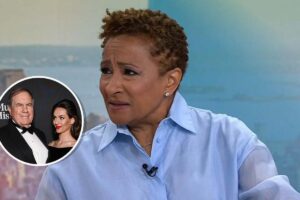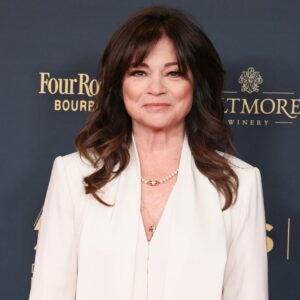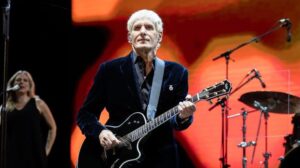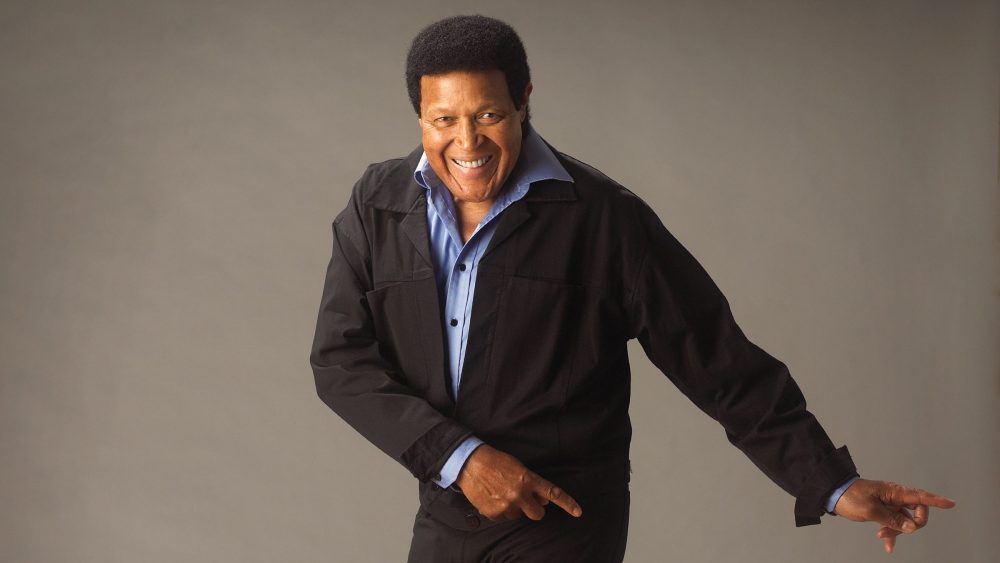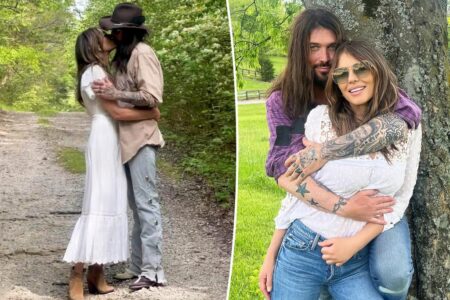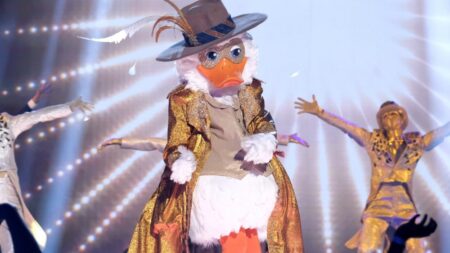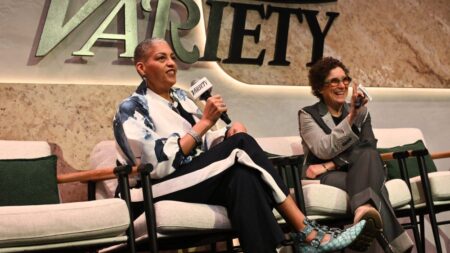When the Rock and Roll Hall of Fame announced Sunday night that Chubby Checker would be inducted into its ranks later this year, many fans of early rock ‘n’ roll who’d assumed that the Hall would never reach back that far again were surprised and exultant that a longtime wrong was being righted. The man who popularized “The Twist” with his 1960 smash single of the same name – an artist eligible for the honor since the very first Hall of Fame class in 1986 – was finally getting his flowers the very first time that he was put up for its nomination.
Whether Checker should have gone in decades ago has long been a debate among the rock cognoscenti, even as it felt like the Rock Hall’s board was unlikelier than ever to even reconsider the question. Checker had not made a major point of lamenting his MIA status every year since the seeming snub became apparent, but he did make his feelings clear in a public way nearly a quarter-century ago. In 2002, he protested outside Cleveland’s Rock Hall museum over the lack of radio airplay for “The Twist” and his perception that the Hall had snubbed his credits by denying him entry.
Checker laughs about that protest now. In an interview, he actually brings it up, chuckling, before anyone else can. But his worthiness is not a laughing matter. There’s an argument to be made that he did with “The Twist” – and in fact all of his famous dances – opened the door to so much of what is dancefloor-friendly now, from disco to hip-hop. He helped popularize other dance crazes such as “the Pony” with 1961’s “Pony Time,” “the Fly” with that same year’s single of that name, and the limbo with 1962’s “Limbo Rock.” So he’s not a one-hit wonder, but if you did want to consider him such, what a one hit that was: Chubby’s 1960 version of the Hank Ballard-penned “The Twist” was placed atop Billboard‘s list of all-time No. 1 Hot 100 singles from 2008 until September 2020, when the Weeknd’s “Blinding Lights” took over the honor.
The relative lack of airplay for “The Twist” nowadays is still something that rankles him, even as he is finally able to scratch a Hall of Fame honor off his list. “The Rock and Roll Hall of Fame says I’m in, and I appreciate that,” he says. “But I want to hear my music” on the radio, “and get it heard like (other rock pioneers) do.”
An interesting observation: you don’t do “oldies” package shows or tours, as so many do. You only do Chubby Checker concerts.
My manager Shelly (Field) says to me, “You’re not an oldie. You’re an icon. You deserve to get paid as an icon.” We do Chubby Checker.
How put out did you really feel, not being in the Hall?
The shows that you’re talking about — not being an oldies act, but being “Chubby Checker” —that’s my Rock and Roll Hall of Fame. That’s it. What they’re giving me is what I get every time that I go on stage. Now, there was that controversy back in the day [laughs], where I told them that, because of what we’ve done in the music industry, the Hall should erect a statue of Chubby Checker in its courtyard inviting everyone in to rock ‘n’ roll. Everyone got so angry about that. Everybody’s made a whole lotta money off of Chubby. Give the man some credit!
You’re laughing about it all now. Were you doing that protest to prank the Rock Hall?
No. I’m just so excited about what we do in the music industry. I never use a past tense and say “did,” because we’re still doing it. They turned all of my dances into the boogie. Well, now you’re talking to the Boogie Man [laughs].
What was the first thing you did when you got the call on Sunday about being inducted? And are there anyone that you’d like to see welcome you into the Hall?
I was thinking that if I was chosen, or that if I wasn’t chosen, I’m still Chubby. What we did then, what we do now, is still there. And whoever does the inducting, it’s OK. It’s just a great thing that it’s happening. And if they finally put my statue up, well, I might not be alive to see that happen, but people will enjoy it.
Look, we have bookings three years from now. We do this for people, always. I’m sitting in my tour bus now at the back of my driveway, running the generator to make sure the engine and the battery is still strong to play the shows we have coming on the next go-round. I feel very show biz, too, talking from the bus.
Chubby Checker
Courtest ABKCO Records
Let’s go back to the beginning, when you were falling in love with music in South Carolina, after witnessing country singer Ernest Tubb.
I was 4 years old when I saw Ernest Tubb. From there, all I wanted to do was be on stage, and sing music. There was nothing else in my head. I was an obnoxious kid from the time I was 4 until I hit 17 and made my first recording. Between South Carolina and that first single (1959’s “The Class”) is when rock ‘n’ roll started. In 1951, Billy Ward & his Dominoes had a song, “Sixty Minute Man.” [Checker begins singing it.] That was crazy. Finally, I move to Philadelphia, and start singing with my little band, the Quantrells, doing doo-wop.
You could hear the soul in your voice, its musicality, on “The Class” (a record where he imitates Fats Domino, Elvis Presley, the Coasters and the Chipmunks). What were you looking to do, or be, then?
I just loved rock ‘n’ roll music. Rock ‘n’ roll wasn’t soul music. “Soul” came in when Ray Charles pushed that word around. Alan Freed [the seminal rock DJ] did a great thing for Black kids by breaking down barriers, giving them a shot, and coining the term “rock ‘n’ roll.” That’s why the Rock Hall is in Cleveland [where Freed was based]. And who did they ask to come and sing there when they were looking to erect the hall in Cleveland? Chubby Checker.
Let’s talk about “The Twist” coming to you, or you coming to it. How did the Hank Ballard song get to you?
I heard Hank’s song, and knew all the lyrics. It was played all the time on R&B radio, but never on pop radio to that point. His “Twist” wasn’t as big a hit for him as other songs of Hank’s had been. Now, I had just done that song “The Class,” when Dick Clark heard it. I was still in high school. Dick Clark said, “Let’s give Chubby ‘The Twist.’ I can see some kids doing funny dances around you. Chubby needs a song. Give him the song.” So, I did the song with (producer) Dave Appel, recorded it four times, when he said that there was this one flat note. I told him that I had to go home and do my homework because I was having trouble in class. I promised him they’d never know (the note was flat). Little did I know that that song would change my life, and the entire industry.
As a performer, what did you bring to “The Twist” that Ballard, perhaps, did not?
I had a very big ego back then. I had a very beautiful appearance when I went on stage. In fact, in my frustration, I gave something to Muhammad Ali. As a boxer, with anything that he did, as long as he beat everybody up, there was nothing they could do about it. Meanwhile, my success was in the hands of other people, and I was frustrated by that. When I met Cassius Clay, he asked me about making a name for himself. I vented all my frustrations to him, and he ran with it” “Tell them you’re the greatest and the prettiest!” He had the bigger mouth than me, but I’m the guy screaming inside of Ali.
I thought that I was the greatest performer alive, and the most beautiful man in the world, when I did my shows. I also worked very hard on stage. There was this man, Lou Spencer, who I paid good money to, to follow me around for two years to teach me to be a great performer. He used to say to me, “After you have no more hit records, they’ll still think of you as a great performer and come see you, because you have what it takes.” He trained me, and I didn’t realize just how right he was until 15 years later, when I didn’t have any hits, but people were still coming to see me the way they would come to see Frank Sinatra, Ella Fitzgerald and Sammy Davis Jr. I didn’t have new hits, but I had a crowd.
Were you much of a dancer before “The Twist”?
I danced. We did “the Swing,” swing dancing. Rock ‘n’ roll dancing was what the big bands (brought on with their influence). “The Swing” went on through Elvis, Fats Domino. They did “the Swing” to “Whole Lotta Shakin’.” They did “the Swing” to “Peggy Sue.” It was right there. Now, “The Twist” comes along…
You should check out the history of television, and see what happened before Chubby Checker and after Chubby Checker did his 2:52 singing “The Twist” on “American Bandstand” (on Aug. 6, 1960). The world changed. Music changed. I believe that historians have twisted things so as to not shine a light on Chubby Checker for this. That gave us a dance style that is as old as my career. I’m looking at the girl. The girl is looking at me. She’s wearing her best stuff and dancing in front of me. I’m all dressed up too, dancing in front of her, and we’re looking at each other. Face to face. Very sensual. How exciting is that?
Why do you believe that historians twisted things, or didn’t want to give you that credit?
That’s not so important… Dancing apart to the beat is what “The Twist” is. Now, we came up with “The Pony,” and then “The Fly,” which was the whole “throw your hands in the air, and wave them like you just don’t care” thing — we did that with “The Fly.” And if you’re doing that, you’re doing “The Shake” because you can’t do one without the other.
Then we took this old nasty dance by Paul Williams and his Big Band from 1949 – Sinatra did it and it wasn’t successful by him, same with Ray Anthony – and had a hit with “The Huckle-Buck.” What Chubby did, then what society did, was slow it down. No one wanted to sweat and mess up their make-up. And when we slowed it down, sex came onto the dancefloor. Then they took “The Twist,” “The Fly” “The Pony,” “The Shake” and “The Huckle-Buck,” and made all that into doing the boogie.
During the time of hit after hit, show after show, were there any professional gigs that still rock your world?
That’s all behind me. The most important show in my life is the next one that I am going to do, and think of doing. My whole life has led to that one show. Then the one after that.

Chubby Checker
Courtesy ABKCO Records
You’ve been married to the same woman since 1964 (Catharina Lodders, Dutch model and Miss World 1962). There’s never been a scandal, and you’ve never said anything political that someone has heard to make anyone think of you one way or another. How have you steered clear of any hint of trouble for six decades?
I keep my private life private. What brought me to where I am isn’t anything but music. So much music. I don’t want people to think that I have a big head, but before we came along, people weren’t really dancing to that music. I take credit for disco. When a producer asked me once about making a disco remix, I told him that I already did that. Hip-hop? What does “The Pony” do? He hips and he hops! That little dance that people do when they’re holding their crotch? That’s “The Pony.” I started that. The “wave your hands in the air” thing? That’s “The Fly.” Been there. Done that. Whether I get credit or not doesn’t change the fact that I did it.
You know what I do want from the music industry – or maybe I don’t care anymore, I don’t know – is to hear my music in the same way people can hear Billy Joel, the Beatles, Elton John or Fleetwood Mac: everywhere. On the radio. In supermarkets. I want to hear my music liked like them. The Rock and Roll Hall of Fame says I’m in, and I appreciate that. But I want to hear my music, and get it heard like they do. Billboard gave me the first No. 1 song of all time for “The Twist” in 2008, because it was on top longer than any other song. I want people to hear it. I want to hear it. They don’t have the No. 1 song on the planet; I do. And by the way: the dancefloor that so many of these artists enjoy and make millions of dollars on – I put it there. And it’s still there.
How would you describe the arc of your career since that rush of dance hits? In the 21st century, you did release new singles (“Knock Down the Walls,” “Changes”) and albums (“Towards the Light”). You never stop playing live shows.
I think… [long pause]… To invent the wheel twice is very difficult. What we created years ago is still going on.
Look, I’m blessed. You know that Ernest Tubb thing you talked about? All I ever dreamt of, from the time I saw him as a kid, was being on stage. So, every time that I am on stage, I’m back to Ernest Tubb again, and my dream comes true, renewed all over again.
Read the full article here
